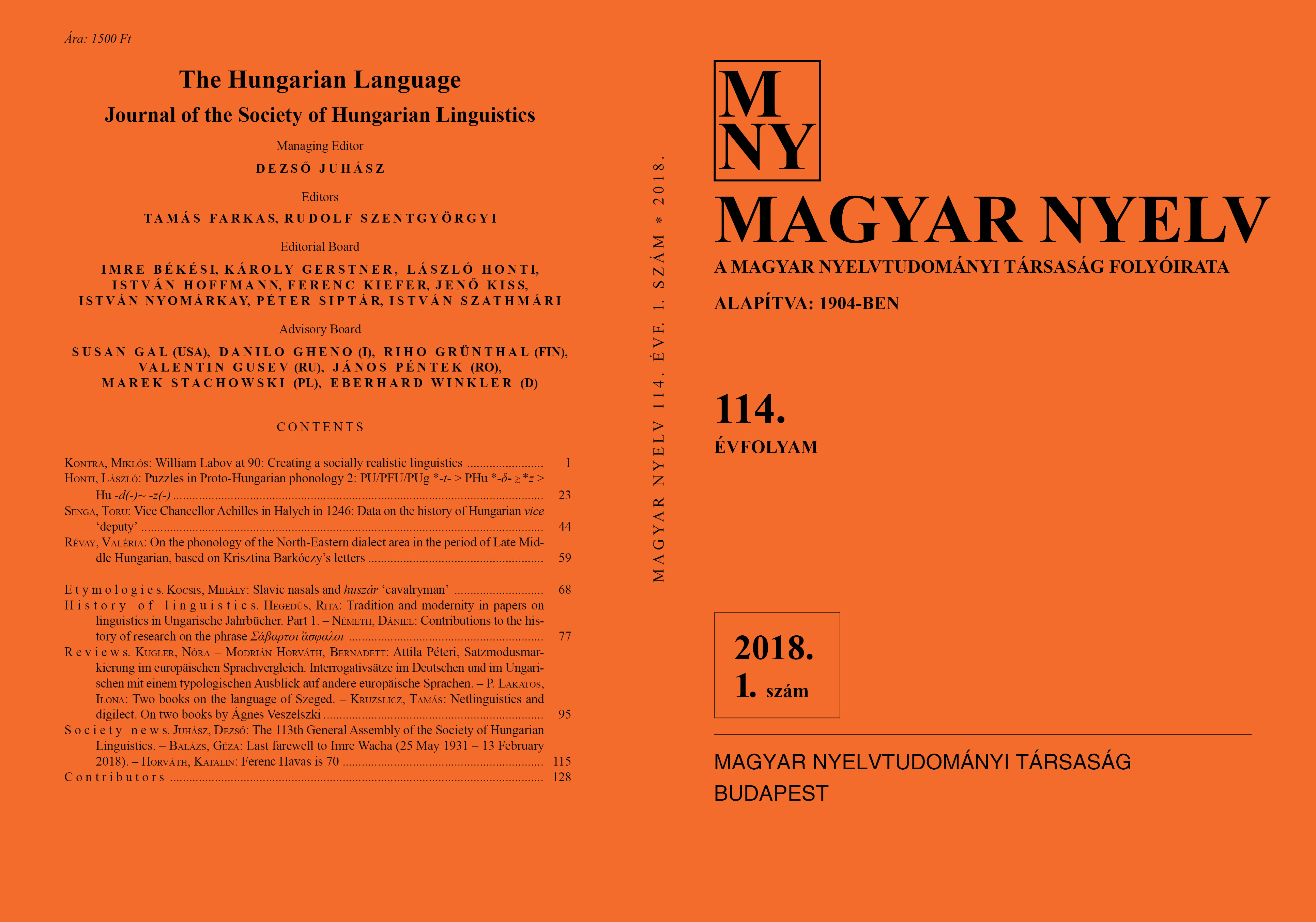Puzzles in Proto-Hungarian phonology 2
PU/PFU/PUg *-t- > PHu *-δ- >*z > Hu -d(-)~ -z(-)
DOI:
https://doi.org/10.18349/MagyarNyelv.2018.1.23Keywords:
Proto-Hungarian, Iranian, contact, etymology, sound change, semanticsAbstract
The Hungarian lexicon exhibits four sets of lexemes in which researchers traditionally assume the unusual consonant alternation z ~ d rather than the otherwise expected (non-alternating) z: bűz ‘stench’ ~ büdös ‘stinky’; víz ‘water’, vizes ‘watery’ ~ vides ‘id.’, vedel ‘swill’; ez ‘this’ / az ‘that’ ~ ide ‘to this place’ / oda ‘to that place’; íz ‘taste’, ízes ‘tasty’ ~ édes ‘sweet’. Of these, bűz ~ büdös go back to an Old Iranian loanword, and the source of the different Hungarian reflexes might be an alternation in the Iranian source languages (d/δ ~ z). In the cases of víz, vizes ~ vides, vedel, and ez/az ~ ide/oda, a sound change PU/PFU/PUg *-t- > PHu *-δ- > *-z- > Hu -d(-) ~ -z(-) that may have taken place in the language of part of the Ancient Hungarian population may have given rise to the present-day dual reflexes. Both of the adjectives ízes ~ édes are taken to be derivatives of íz in the traditional etymological literature, taking ízes to be the regular form and édes to be the result of analogy based on the alternation z ~ d seen in the other three groups of words. The present paper argues that édes goes back to a now extinct Hungarian ed, éd ‘grain’ whose Zyrian reflex has assumed the meaning ‘tasty, pleasant’ in addition to ‘flour’; something similar may have happened in Hungarian, too. – The most compelling evidence supporting the explanation PU/PFU/PUg *-t- > PHu *-δ- > *-z- > Hu -d(-) ~ -z(-) presented here is the existence of the groups ez ‘this’ / az ‘that’ ~ ide ‘to this place’ / oda ‘to that place’ and (víz ‘water’ >) vizes ~ vides ‘watery’, vedel ‘swill’.
Downloads
Published
Issue
Section
License
Copyright (c) 2024 Szerkesztő MNy

This work is licensed under a Creative Commons Attribution-NonCommercial-NoDerivatives 4.0 International License.
Magyar Nyelv is a Diamond Open Access periodical. Documents can be freely downloaded and duplicated in an electronic format, and can be used unchanged and with due reference to the original source. Such use must not serve commercial purposes. In the case of any form of dissemination and use, Hungarian Copyright Act LXXVI/1999 and related laws are to be observed. The electronic version of the journal is subject to the regulations of CC BY-NC-ND (Creative Commons – Attribution-NonCommercial-NoDerivatives).
The journal permits its authors, at no cost and without any temporal limitation, to make pre-print copies of their manuscripts publicly available via email or in their own homepage or that of their institution, or in either closed or free-for-all repositories of their institutions/universities, or other non-profit websites, in the form accepted by the journal editor for publication and even containing amendments on the basis of reviewers’ comments. When the authors publicize their papers in this manner, they have to warn their readers that the manuscript at hand is not the final published version of the work. Once the paper has been published in a printed or online form, the authors are allowed (and advised) to use that (post-print) version for the above purposes. In that case, they have to indicate the exact location and other data of the journal publication. The authors retain the copyright of their papers; however, in the case of an occasional secondary publication, the bibliographical data of the first publication have to be included.



